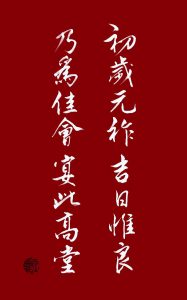This year’s Chinese New Year, which is the first day of the lunar year, is coming in less than a month on February 8th. According to ancient tradition, families gather around for dinner on New Year’s eve, symbolizing the start of a fifteen-days celebration from lunar January 1st to the 15th, which is also the Lantern Festival.

The first day of the year, auspicious day and time. Joyful gathering and celebration, banquet held in royal hall.
Traditionally, the main dish of the meal on New Year’s eve for many families, including ours, is dumplings (jiaozi). Dumplings are one of the most welcomed dishes in Chinese food culture due to their easy-to-cook quality, bite size, and a good variety of flavors with all kinds of nutrition, including that for vegetarians. However, the main reason dumplings became a must on our New Year’s dinner table is because of their appearance. The shape of a dumpling resembles the ancient currency, yuan bao, which is either gold or silver ingots. Therefore people believe having dumplings right before (and during) the New Year celebration will bring us wealth and fortune in the coming year.
In my family, we have a special tradition of stuffing a few of the dumplings with a one dollar coin while we hand wrap them. This brings the illusion of good fortune closer to reality, particularly for those who are lucky enough to taste the coins in their dumpling. This little tradition certainly makes dumplings everyone’s favorite dish during New Year’s celebration and definitely highlights every one of our New Year’s meals.
May all the wonderness in life be with you through the following poetry written by Cao Zhi (曹植) roughly 1800 years ago. It describes a royal celebration on the first day of a New Year.
